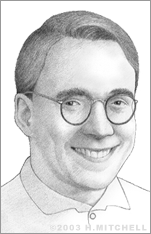Linus Torvalds
Linus Torvalds, creator of the Linux Operating System, was born December 28, 1969 in Helsinki, Finland. His grandfather had a Commodore VIC-20 that he had the opportunity to work with; by age ten he was already dabbling in programming. He enrolled at the University of Helsinki in 1989, and in 1990 he took his first C programming class.
In 1991, Torvalds decided that his new MS-DOS-driven PC needed an alternative operating system. He had enough programming know-how under his belt to assume that he could achieve this himself. His goal was to create a UNIX-like operating system he could use at home. Using the Marice J. Bach book “Design of the Unix Operating System” as a guide, he set out to create the system, working long, hard hours until, at age 22, he completed a rough version. He called his system “Linux,” a combination of UNIX and his name, and posted the source code free on the Internet.
Torvalds’ philosophy was that if he made the software available for free downloading, including the source code, anyone with knowledge of and interest in computer programming could modify the system and ultimately make it better, and/or modify it for their own specific purposes. Linux quickly gained popularity among hard-core computer users. Licensed under a GNU General Public License, the system is available free to anyone who can get, use, modify, distribute and copy it. By 1999, an estimated seven million computers were running on Linux.
Linux gained acceptance in business circles as a stable operating system that rarely crashes, and large computer corporations such as IBM, Compaq, Intel and Dell also begun to develop machines that support it. Linux gained popularity in the consumer PC market as well.
Torvalds made his personal mascot a penguin named “Tux,” which became a recognizable symbol for Linux around the world. Torvalds spent 1988-1997 at the University of Helsinki, coordinating development of the Linux kernel and furthering his studies. He moved to the United States in 1997 to begin working for Transmeta, where he helped to design the Transmeta Crusoe Processor, a power-saving CPU. In 2003, Torvalds left Transmeta to focus on the Linux kernel through the Open Source Development Labs (OSDL). The OSDL’s purpose was to promote Linux development. OSDL merged with The Free Standards Group in January 2007 to become The Linux Foundation. Torvalds remains the authority on what new code is incorporated into the standard Linux kernel.
Torvalds has become internationally known, having been recognized with such honors as the 1997 Nokia Foundation Award and the Uniforum Pictures Lifetime Achievement Award.


